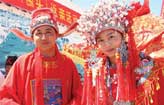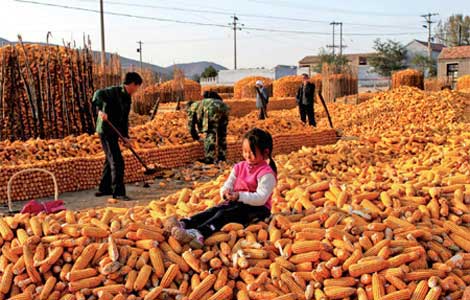Photos
Vagrant kids get a new start
Updated: 2011-08-10 07:36
By Cui Jia (China Daily)
|
![Vagrant children from the Xinjiang Uygur autonomous region rescued from criminal gangs and sent back to the region by the authorities in places where they had been coerced into stealing, stand in line waiting for assistance and aid at a vagrant children relief center in Urumqi, the regional capital, on Aug 4. [Zhang Tao / China Daily] Vagrant kids get a new start](../../images/attachement/jpg/site1/20110810/0013729e48090fac073705.jpg) |
|
Vagrant children from the Xinjiang Uygur autonomous region rescued from criminal gangs and sent back to the region by the authorities in places where they had been coerced into stealing, stand in line waiting for assistance and aid at a vagrant children relief center in Urumqi, the regional capital, on Aug 4. [Zhang Tao / China Daily] |
Xinjiang children rescued from gangs who forced them to steal return home
URUMQI - Yusup can vividly remember the day he was first forced to pick pockets in a strange city about 4,800 kilometers from his hometown of Hotan, in the Xinjiang Uygur autonomous region.
"The first thing I stole was a mobile phone, which was worth about 1,000 yuan ($156)," said the 11-year-old. "I was so glad because it made the difference between having food to eat that day and going hungry."
Like a majority of vagrant Xinjiang children, Yusup had been lured away from his hometown and then forced to steal or beg for a living.
For most of the past year, he "worked" for a criminal gang in Yibin, Sichuan province. Then he was lucky enough to be one of the vagrant Xinjiang children who were rescued and returned home in early August.
From April, when Xinjiang first promised to bring home all its children who have become vagrants, to the present, 229 children like Yusup have been rescued and returned, according to figures available on Tuesday.
That number has almost doubled from what it was in the same period last year, said Wang Zhengpeng, director of the Xinjiang Relief Center in Urumqi, capital of the region.
The campaign is aimed at helping such children resume normal lives and at restoring the reputation of the region, which has become known as a den of thieves and vagrants to many people.
Most of the children rescued so far are between the ages of 10 and 18 and a majority of them are Uygurs from Kashgar, Hotan and Aksu, cities in southern Xinjiang, according to the latest figures released by the center. Zhejiang and Jiangsu provinces and Beijing are the three places that have sent back the most children.
"The number of vagrant children coming from Xinjiang reached a peak in 2005 and 2006 because of the disparate development between Xinjiang and other parts of the country," Wang said.
"Back then, a few thousand of them were sent back every year. Many of them were forced into stealing by criminal gangs after being conned by fake job offers in large and medium-sized eastern cities or kidnapped."
Many of the children who were rescued were found with scars and cigarette burns all over their bodies. Some gang members have even asked the children to carry blades and to cut themselves if they are rescued. That is done, Wang explained, so that the children will be brought to hospitals, where they can easily escape and return to the gangs.
Yusup will spend two weeks at the Xinjiang relief center in Urumqi, where workers will perform a thorough health check and give him counseling.
More importantly, they will try to help him re-unite with his family by gathering as much information as possible about him.
The 11-year-old looks young for his age. That is largely a product of poor nutrition and of an ear infection he contracted because he was living in filth.
"The younger the children that are rescued, the better their future will be," said Liu Wei, who is in charge of taking minors to the center.
"It's more difficult to rehabilitate them once they become hardened to the vagrant way of life."
"I didn't want to steal and I missed home, but I had no choice," Yusup said. "I really want to go to school. You don't know how jealous I am when I see children being picked up by their parents from schools in Yibin."
Liu said Hotan authorities will make sure Yusup resumes his education after he returns home and settles down. He said stories like Yusup's are what make his work worthwhile.
"It's a very rewarding job."
As part of the campaign, the region has sent police capable of speaking both Mandarin and Uygur to assist public security authorities in other provinces.
The Ministry of Public Security has also ordered police authorities throughout the country to start cracking down on the kidnapping and coercing of Xinjiang children.
E-paper

My Chinese Valentine
Local businesses are cashing in on a traditional love story involving a cow herder and a goddess
Outdoor success
Lifting the veil
Allure of mystery
Specials

Star journalist leaves legacy
Li Xing, China Daily's assistant editor-in-chief and veteran columnist, died of a cerebral hemorrhage on Aug 7 in Washington DC, US.

Sowing the seeds of doubt
The presence in China of multinationals such as Monsanto and Pioneer is sparking controversy

Lifting the veil
Beijing's Palace Museum, also known as the Forbidden City, is steeped in history, dreams and tears, which are perfectly reflected in design.
